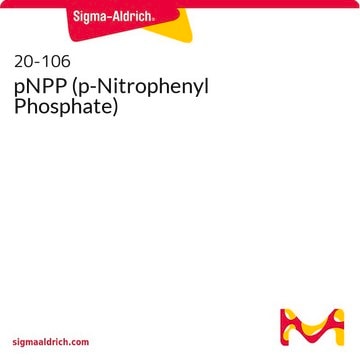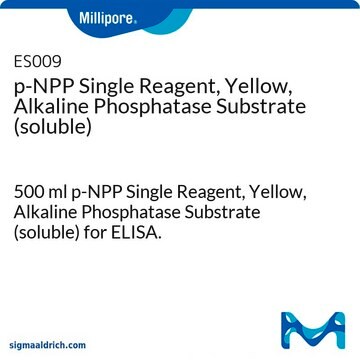487664
p-Nitrophenyl Phosphate Substrate Buffer
This p-Nitrophenyl Phosphate Substrate Buffer is validated for use in ELISA.
Sign Into View Organizational & Contract Pricing
All Photos(1)
About This Item
UNSPSC Code:
41116158
NACRES:
NA.77
Recommended Products
Quality Level
sterility
non-sterile
form
liquid
manufacturer/tradename
Calbiochem®
storage condition
OK to freeze
protect from light
color
clearlight yellow
shipped in
wet ice
storage temp.
2-8°C
Related Categories
General description
Alkaline phosphatase substrate buffer supplied as ready-to-use. A diluent for Cat. No. 487663.
This p-Nitrophenyl Phosphate Substrate Buffer is validated for use in ELISA.
Application
ELISA (see comments)
Biochem/physiol Actions
Primary Target
Alkaline phosphatase substrate buffer
Alkaline phosphatase substrate buffer
Product does not compete with ATP.
Warning
Toxicity: Standard Handling (A)
Other Notes
Product tested for stability at 4°C, 18-26°C, and 37°C. Product performance is tested on the final product by ELISA.
Suggested procedure for use of p-NPP in alkaline phosphatase-based ELISAs:
1. To 39 parts distilled water add 1 part 50X p-NPP Concentrate (Cat. No. 487663) and 10 parts p-NPP Substrate Buffer. Mix well and store protected from light. This diluted reagent is suitable for up to 10 h after preparation.
2. Complete all required incubations with antibodies and alkaline phosphatase-labeled probes.
3. Wash plate wells at least 4 times with Tris-buffered saline (TBS) containing 0.1% Tween®-20 detergent. DO NOT USE PHOSPHATE BUFFERS; inorganic phosphate is a potent inhibitor of alkaline phosphatase.
4. After the final wash, shake and blot all residual buffer from the wells.
5. Add 100 µl of 1X p-NPP Substrate Solution to each well and incubate for 15-60 min. (If a kinetic study is desired, readings at 405 nm may be taken at intermediate intervals).
[Note: Optimal incubation times may vary depending on the amount of enzyme present. If color develops too quickly, dilution of the probe, antibody, or alkaline phophatase-labeled reagent may be required.]
6. Stop the reaction by adding 100 µl of 1 N NaOH.
7. Read absorbance at 405 nm.
Note: Variations in time, reagent volumes, and temperature may require further standardization by the user.
Suggested procedure for use of p-NPP in alkaline phosphatase-based ELISAs:
1. To 39 parts distilled water add 1 part 50X p-NPP Concentrate (Cat. No. 487663) and 10 parts p-NPP Substrate Buffer. Mix well and store protected from light. This diluted reagent is suitable for up to 10 h after preparation.
2. Complete all required incubations with antibodies and alkaline phosphatase-labeled probes.
3. Wash plate wells at least 4 times with Tris-buffered saline (TBS) containing 0.1% Tween®-20 detergent. DO NOT USE PHOSPHATE BUFFERS; inorganic phosphate is a potent inhibitor of alkaline phosphatase.
4. After the final wash, shake and blot all residual buffer from the wells.
5. Add 100 µl of 1X p-NPP Substrate Solution to each well and incubate for 15-60 min. (If a kinetic study is desired, readings at 405 nm may be taken at intermediate intervals).
[Note: Optimal incubation times may vary depending on the amount of enzyme present. If color develops too quickly, dilution of the probe, antibody, or alkaline phophatase-labeled reagent may be required.]
6. Stop the reaction by adding 100 µl of 1 N NaOH.
7. Read absorbance at 405 nm.
Note: Variations in time, reagent volumes, and temperature may require further standardization by the user.
Legal Information
CALBIOCHEM is a registered trademark of Merck KGaA, Darmstadt, Germany
TWEEN is a registered trademark of Croda International PLC
Certificates of Analysis (COA)
Search for Certificates of Analysis (COA) by entering the products Lot/Batch Number. Lot and Batch Numbers can be found on a product’s label following the words ‘Lot’ or ‘Batch’.
Already Own This Product?
Find documentation for the products that you have recently purchased in the Document Library.
Customers Also Viewed
Our team of scientists has experience in all areas of research including Life Science, Material Science, Chemical Synthesis, Chromatography, Analytical and many others.
Contact Technical Service













